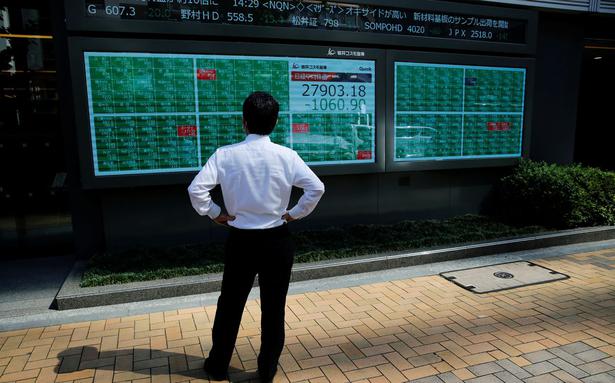The surge in oil prices above $130 a barrel was triggered by the possibility that the US could block crude oil imports from Russia
The surge in oil prices above $130 a barrel was triggered by the possibility that the US could block crude oil imports from Russia
Stocks fell in Asia on March 8 after Wall Street posted its biggest drop in more than a year as markets were rocked by a further rise in oil prices. Benchmarks fell in Tokyo, Sydney, Hong Kong, Seoul and Shanghai after the S&P 500 fell 3%.
Oil’s surge above $130 a barrel on Monday was prompted by the possibility that the US could block crude oil imports from Russia. Oil prices stabilized later in the day and were moderately higher early Tuesday. A third round of peace talks between Ukraine and Russia yielded no significant results. A senior Ukrainian official said there was minor, unspecified progress in establishing secure corridors allowing civilians to escape the fighting.
But Russian forces continued their shelling as food, water and medicines grew scarce in Ukraine. Rising prices for oil and other essential commodities are shaking global markets, and the situation remains uncertain as investors seek safe havens ahead of escalating sanctions on Russia.
Analysts expect the war in Ukraine to remain high on the agenda for some time and say the full impact of the conflict is yet to be fully considered. “Disruptions in energy markets and the possibility of a geopolitical paradigm shift make for a highly unpredictable environment,” SPI Asset Management’s Stephen Innes said in a comment. However, he added, “We should get to a point where stocks start pricing in – there’s light at the end of the tunnel.”
Japan’s benchmark Nikkei 225 lost 1.7% to 24,783.70 in afternoon trade. Australia’s S&/ASX 200 was down 0.8% at 6,980.30. South Korea’s Kospi slipped 0.8% to 2,631.49. Hong Kong’s Hang Seng slipped 0.5% to 20,956.39, while the Shanghai Composite fell 1.2% to 3,333.49.
On Monday, Wall Street’s S&P 500 fell 122.78 points to 4,201.09. The Dow Jones Industrial Average fell 2.4% to 32,817.38. The tech-heavy Nasdaq Composite slipped 3.6% to 12,830.96 and is now 20.1% off its November record. That means the index is in what Wall Street is calling a bear market. The S&P 500 is down 12.4% from its peak in early January.
Gold — a sign of jitters on Wall Street — also rose, although not quite as much as it did when oil prices peaked. Gold prices briefly reached $2,007.50 an ounce. As of Tuesday afternoon, it was at $1,995.88, down 0.1%.
U.S. crude rose $2.67 to $122.07 a barrel in electronic trading on the New York Mercantile Exchange. It settled at $119.40 a barrel on Monday, up 3.2% after hitting $130.50 earlier. Brent crude, the international price standard, rose $3.75 to $126.96 a barrel. It had settled at $123.21 a barrel, up 4.3% after topping $139 earlier.
There are growing concerns that Russia’s invasion of Ukraine could upend already tight oil supplies. Russia is one of the world’s largest energy producers, and oil prices were already high before the attack as the global economy demands more fuel following the coronavirus-induced shutdown. A US ban on imports of Russian oil and other energy products would be an important move for the US government, although the White House has said it hopes to limit disruptions in oil markets and pump price spikes.
US officials may be considering easing sanctions on Venezuela, according to reports. This could potentially release more crude and allay concerns about reduced supplies from Russia. A gallon of regular is already averaging $4,065 across the country after surpassing $4 for the first time since 2008 on Sunday. A month ago, a gallon averaged $3,441, according to AAA.
The war is putting additional pressure on central banks around the world, with the US Federal Reserve on track to raise interest rates later this month for the first time since 2018. Higher interest rates will slow down the economy, which will hopefully help curb high inflation. But if the Fed hikes rates too quickly, it risks pushing the economy into recession.
“Your reaction to geopolitics can’t really be measured, so there’s uncertainty on that,” said Sameer Samana, senior global market strategist at the Wells Fargo Investment Institute. Aside from the sanctions imposed by governments against Russia for its invasion of Ukraine, companies are also imposing their own fines.
The list of companies leaving Russia has grown to include Mastercard, Visa and American Express, as well as Netflix. On Wall Street, shares of Bed Bath & Beyond rose 34.2% to $21.71 after billionaire Ryan Cohen’s investment firm took a nearly 10% stake in the company and recommended big changes.
Cohen is a co-founder of Chewy, and he’s amassed something of a cult following after taking a stake in GameStop, the ailing video game chain that eventually named him CEO. Treasury yields rose, with the 10-year rising to 1.78% from 1.72% late Friday. In forex trading, the US dollar rose to 115.48 Japanese yen from 115.32 yen. The euro cost $1.0865 versus $1.0853.



